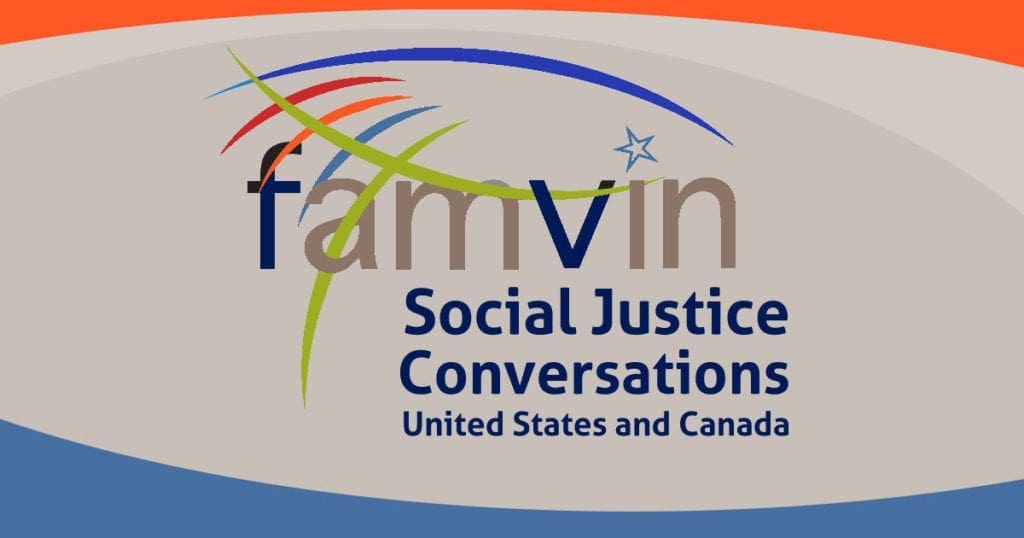The privilege of being part of the Vincentian Family Justice Representatives also involves a serious responsibility to learn and grow with issues of social justice. In recent months, we have delved deeply into what reparations mean for systemic racism and for First Nation Peoples. A book I providentially picked up in a “little library” in Denver is called Dear Church, by Lenny Duncan, a black pastor in a Lutheran church. Difficult conversations follow such a reading, as we learn of our complicity in issues of social justice. The inspiration for my thoughts is directly inspired by Mr. Duncan in Dear Church.

Dear Church,
I write because I love our Church. I love that I have grown in my own relationship with God and with God’s people through membership in this church. I love the opportunities I have had for ministry through our church and for seeing the world from the underside.
And I realize more and more that we must atone. We must admit our complicity. We must make reparations for the sins of our past. Sins against First Nation Peoples, against Black people, against victims of the priest scandals, against women, against people who identify as LGBTQ.
Mr. Duncan says, “The Beatitudes are at the very root of the Gospel; to abandon them would be to abandon my ordination.”(p. 125) If we were to truly embrace being poor and being meek, I believe the discrepancies between rich and poor would evaporate. If we were truly hungry for righteousness, we would work toward the reparations that are long overdue people who have been wronged. If we truly understand our role in the system, we would mourn our participation and perhaps be comforted by any means of restitution we enact. If we were truly merciful, people would not be suffering from the oppression and injustice that so divides us. And I believe we can see God if we are made new and accept the pure heart that God is offering us. We must not abandon the Beatitudes, or we abandon the core of our faith.
A second thought that touched me is, “Dear Church, you aren’t dying; you are being refined…I understand that growth and change often feel like death at first. But I promise you that we aren’t dying.”(p. 147) We are experiencing a refinement that sometimes feels like dying. Seeking justice means examining myself, being willing to change and grow, seeing how the sins of the past still connect to the sins of today. And realizing my individual role along with the role of the communities to which I belong is a part of the refinement that makes it feel as though we are dying, when in fact we are being refined as true believers of the words of Jesus in the Beatitudes.
Finally, he states, “We are entering an incredible period of rebirth and growth…in nearness to our Creator until our very presence can become a means of grace to a hungry world.”(p. 149)
Dear Church, I am so deeply grateful for the Church’s literal response to a hungry world through organizations like Catholic Relief Services. I am grateful for communities of religious who have responded to medical needs of people who cannot afford health care by creating hospital systems. I am so deeply appreciative of the opportunities in our local parishes to house those who are homeless and to feed those who are hungry. And now I must be grateful for the refinement we must experience to end systemic racism and the injustices that affect too many, a refinement that leads to the rebirth and growth that truly makes us Beatitude people.
By Mary Frances Jaster, MISEVI Representative to Vincentian Family North American Social Justice Committee







Thank you very much, Mary Frances. There is much in what you have written that challenges readers and is worth keeping in the heart and pondering.
But one thing that especially catches my attention is the adjective “dear.” Dear expresses better than “querida” (in the Spanish version—more appropriate, I think, is “carísima” or “estimada”) what to love means, namely, to seek, value, affirm and foster the good or worth of the other.
We know that all that God created is good, valuable, of worth. But more valuable than the lilies of the fields and the birds of the air are human beings, among whom, of course, are the First Nation Peoples, Black people, victims of the priest scandals, women, and people who identify as LGBTQ. Hence, the worth of them all needs affirming and fostering. Surely, sins against them cry out to the Creator.
Enjoyed the article very much and pray that we find our way, Jesus’ way.
I don’t necessarily like the words, “Reparations and Restitution.”
In Reparation, where do we begin and end? Our Catholic Church could be liable for Reparations and Restitution when Jesus called the Twelve and within a short time had left the synagogues and formed our own churches. At the time, the Jewish church lost many of their membership and possibly their contributors. Where do we begin and where do we end?